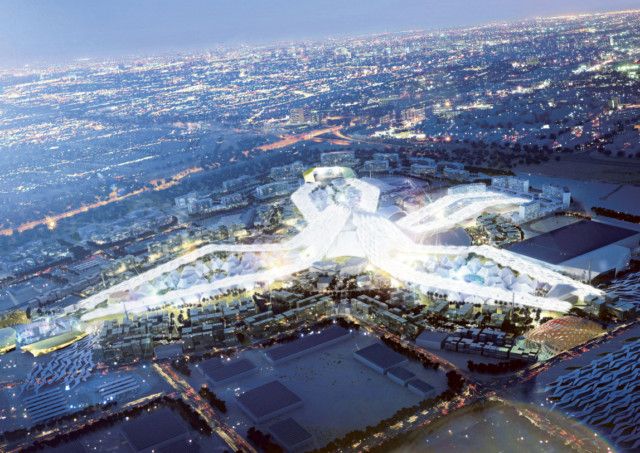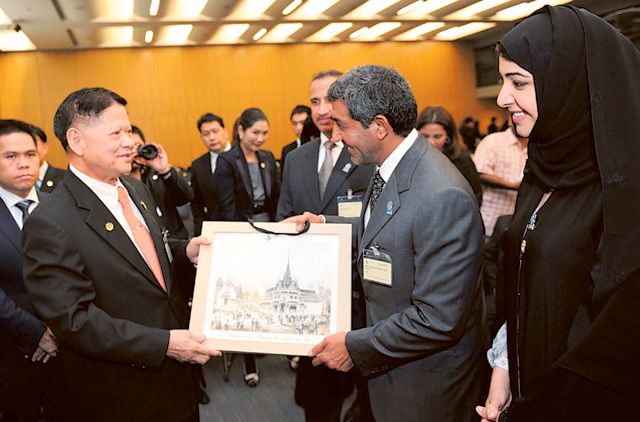Dubai completed the second of five presentations it needs to make to the 160 country members of the Bureau des Expositions in Paris on Tuesday in its bid to play host to the World Expo in 2020.
The prize should it win will be substantial: An expo is worth between 20 and 45 million visitors to the host city, an influx of thousands of new businesses prior to and during the event, representation from over 160 countries, and potentially billions of dollars in new economic activity.
Mix in the PR value of being showcased to the world for a lengthy period of six months, and the legacy of massive infrastructure projects to facilitate an Expo and it is easy to understand why the number of bidders has risen to an all time high: Five countries are pressing their case: Turkey, Brazil, Russia, Thailand and the UAE. At this stage normally only three have made it through.
“It’s the multiplier effect that makes it so valuable,” Helal Saeed Almarri, the CEO of Dubai World Trade Centre (DWTC) told Gulf News. “DWTC events contribute some 2 per cent to the emirate’s GDP, and that’s with 1.65 million visitors to its events. Imagine the effect of 20 million or more visitors to one event over six months.
“Maybe you can’t multiply that contribution to GDP 10 times, but clearly you have to think there are both primary benefits and a lot of secondary ones that will ripple through to the economy.”
There are costs of hosting the event however. China officially spent $4 billion on its bid in Shanghai. Analysts say add the cost of the infrastructure projects that supported it and its final spend was closer to $68 billion.
Dubai has only just awarded the contract to develop its master plan and so has yet to have a final Expo investment figure. Analysts are however working out what it means for the emirate to attract, shuttle and accommodate 300,000 people daily to and from the Expo.
The provisional estimate for this has been put at a ‘conservative’ $2 billion to $4 billion by Dubai’s Hosting Expo Committee – ‘conservative’ if it includes the realization of the regional rail link between Dubai and Abu Dhabi planned for 2017, for Dubai World Central to be fully operational, and for the 430 hectare Exhibition City to be fully built and adapted for its Expo theme of a networked world.
The emirate was one of the first high profile casualties of the world’s financial crises. Dubai has since won plaudits in the way it has handled its restructuring program, but debts remain. Any thoughts this may concern the voting countries were dismissed by the Chairman of Dubai’s bid, Sheikh Ahmed Bin Saeed Al-Maktoum. “When you talk about debt issues you are talking about the companies that have been under restructure. You are not really talking about Dubai itself.”
“The most important thing is the Expo is in line with the strategic direction the country and city has,” UAE Minister of State and Managing Director of the Bid Committee, Her Excellency Reem Ebrahim Al Hashimy, added. “For example, the DWTC at its current capacity needs to expand. It is unable to achieve its growth goals at its current location. So the expectation for growth is there, and its new location is already part of our 2021 plan.”
For Vincente Gonzalez Loscertales, Secretary General of the BIE, this is crucial. “The amount of money you spend depends upon what you want to do. If you want to change the whole city, you will spend a lot of money. But it is not for the Expo.
“The legacy is one of the most important things to consider. The Expo cannot create white elephants. The money invested has to accelerate the development of the city. Otherwise we are wasting money...”
Still however valuable the cause may be, the money still has to be found, something that Al Hashimy admitted had yet to be figured into any plan. “We’re still at the stage of focusing to win this, running the figures to create a sustainable model that is meaningful. We’re not yet at the financing stage.”
Perhaps a more serious concern for Dubai is the size of its population. “For a World Expo clearly size is an important consideration. For a big event you want a lot of people,” Loscertales told Gulf News.
Nearly all of the bids emphasized the size of their captive markets - 145 million in Russia, 90 million in Brazil, 70 million plus in both Turkey and Thailand. The UAE boasts a population of just 8 million people.
Al Hashimy admitted that Expos had traditionally been held in countries with a large native population, but told Gulf News this was not a weakness of the bid, but actually a strength. “If you want to host a World Expo, it has to be an Expo for the World.
“I think our strength is our ability to attract people from across the globe to live in and visit Dubai.
“The mobility of people has changed in the 21st century. We can get a diverse cosmopolitan group of people coming. The UAE has one-third of the world within a direct 4-hour flight … and two-thirds, just an 8-hour flight away.”
“Dubai is a small city comparatively and the UAE a small country comparatively,” Loscertales told Gulf News. “but I would say its chances to win are still high.
“It’s a dynamic hub, and an engine in the world economy. 50 million people pass through its airports every year.
“This is not something small.”














